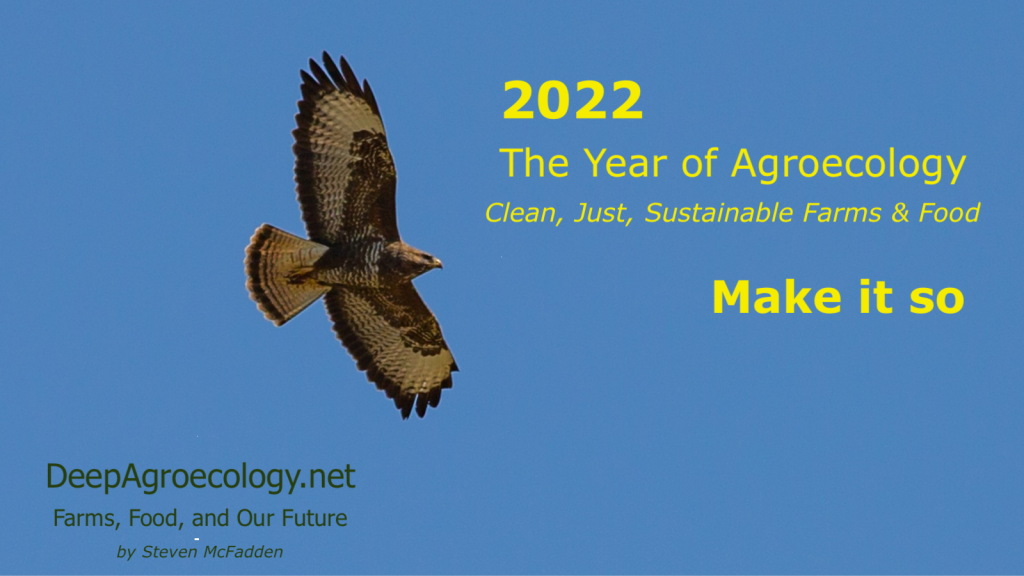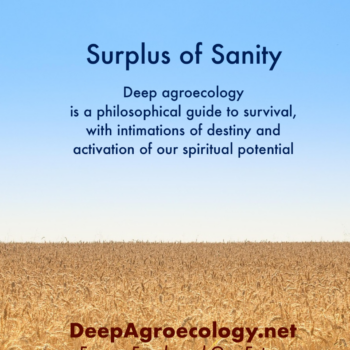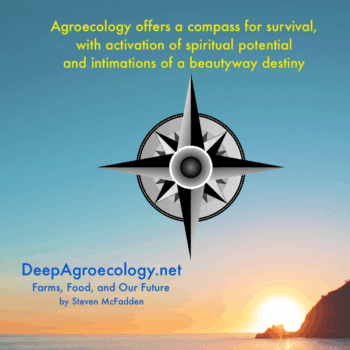As cloaks of summer heat settled upon most of North America, and storms raged severe in sky, land, and sea, I happened upon a 2020 academic review of Deep Agroecology.
I’d missed the review at the time, as I was reckoning that year with the passing of generational elders, and also a household move from Nebraska back to the mountains of the Southwest. But I’m happy to have come upon the review now, some four years later. I needed to hear a familiar chord sounded again.
 Reading the analysis reminded me of the perilous realities that had driven the writing of the book, realities that had gone into soft focus for me since publication five years ago. That came about as, after the year of transition, I became intent on completing another writing project, the biography of Iina’bi’ho spiritual elder Leon Secatero (1943-2008). That book is moving toward completion.
Reading the analysis reminded me of the perilous realities that had driven the writing of the book, realities that had gone into soft focus for me since publication five years ago. That came about as, after the year of transition, I became intent on completing another writing project, the biography of Iina’bi’ho spiritual elder Leon Secatero (1943-2008). That book is moving toward completion.
The 2020 review of Deep Agroecology was written by Hannah Kass, Ph.D and published in the journal Food, Culture & Society. What sparked me in reading the review was her proficient description of my book’s goal: to state plainly the crucial knowledge that agroecology has to offer to the general public, and to sound a call for wide, strategic implementation in our era of mounting perils.
Professor Charles A. Francis (U. Nebraska) suggested the deep agroecology theme to me around 2012. After seven years of study and contemplation what emerged was not so much the expression of a personal vision, but rather the synthesis of a chorus of learned voices. Together they express an evolving vision—a strategic vision—shared by millions of people around the world. Deep Agroecology is my effort to articulate that compelling vision, along with a host of healthy pathways that can lead toward a just, sustainable, and spiritually elevated future.
Despite appearing as an academic concept, agroecology is altogether of the people and the earth: of the way we live on the land, and the way we give and receive sustenance with the earth. As we are at a point of peril, and our farm and food foundations are in critical transition, I wrote Deep Agroecology for the people—for all the people.
 In her book review, Kass noted: “Using the framework of extinction and evolution to explain deep agroecology’s spiritual purpose, McFadden aptly demonstrates the inextricability of physical and spiritual worlds in the food system…He connects these worlds to the political economy of food, pointing out the climate’s ties to the intersecting problems of corporate power, industrialization and rural dispossession.”
In her book review, Kass noted: “Using the framework of extinction and evolution to explain deep agroecology’s spiritual purpose, McFadden aptly demonstrates the inextricability of physical and spiritual worlds in the food system…He connects these worlds to the political economy of food, pointing out the climate’s ties to the intersecting problems of corporate power, industrialization and rural dispossession.”
Agroecology offers a wide array of sensible, sustainable, just, and strategically intelligent pathways to sustain our civilizations, and help them to progress in ever-wiser way.
Terra Madre – We Are Nature
 One place where the theme of agroecology will resonate with power and beauty is at this years 20th anniversary Tierra Madre global food community gathering in Turin, Italy (Sept. 26-0).
One place where the theme of agroecology will resonate with power and beauty is at this years 20th anniversary Tierra Madre global food community gathering in Turin, Italy (Sept. 26-0).
The 2024 theme is “We Are Nature.” As a key part of the proceedings, the conference is establishing a spectacular space dedicated to agroecology: “an alternative food system paradigm that counters industrial agriculture…It is rooted in the reconstruction of relationships between people, agriculture and environment, food systems and society.”
![]()
 The phrase main chance generally refers to the most advantageous prospect available, the opportunity for the greatest progress or gain in any given set of circumstances. I use the phrase now in regard to our tempestuous environmental, climatological, social, and spiritual circumstances.
The phrase main chance generally refers to the most advantageous prospect available, the opportunity for the greatest progress or gain in any given set of circumstances. I use the phrase now in regard to our tempestuous environmental, climatological, social, and spiritual circumstances.










 The consequences of ignoring the changes are obvious to all excepting the willfully ignorant. The Sanskrit word vidya means wisdom or knowledge. The prefix “a” signifies a lack or an absence. Adding the prefix to vidya establishes the word avidya, which denotes a fundamental blindness about reality, a refusal to acknowledge and deal with what is happening. Obviously there is a group of determined avidyans among us. Motivated by self-serving contrarian interests, they have poisoned our politics and thereby crippled our ability to respond to this crisis. But as the new film asserts, no lie can live forever.
The consequences of ignoring the changes are obvious to all excepting the willfully ignorant. The Sanskrit word vidya means wisdom or knowledge. The prefix “a” signifies a lack or an absence. Adding the prefix to vidya establishes the word avidya, which denotes a fundamental blindness about reality, a refusal to acknowledge and deal with what is happening. Obviously there is a group of determined avidyans among us. Motivated by self-serving contrarian interests, they have poisoned our politics and thereby crippled our ability to respond to this crisis. But as the new film asserts, no lie can live forever.



